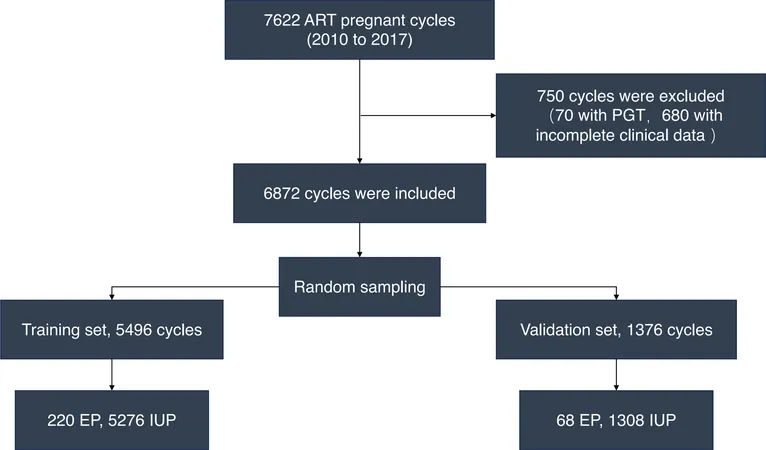
Breakthrough in Alzheimer's Research: Anti-Amyloid Drug Shows Promise in Preventing Dementia
2025-03-19
Author: Siti
Breakthrough in Alzheimer's Research: Anti-Amyloid Drug Shows Promise in Preventing Dementia
In a groundbreaking clinical trial conducted by Washington University School of Medicine (WashU Medicine), researchers have discovered that an experimental anti-amyloid drug may significantly delay the onset of Alzheimer's disease in individuals genetically predisposed to early-onset dementia. This promising outcome raises hopes for a future where Alzheimer’s symptoms can be postponed or even prevented entirely.
The study, spearheaded by Dr. Randall J. Bateman, a prominent neurologist at WashU Medicine, involves patients with rare genetic mutations that predispose them to develop Alzheimer’s disease in their 30s, 40s, or 50s. Remarkably, the trial demonstrated that participants who received the treatment for an average of eight years experienced a dramatic reduction in the risk of developing Alzheimer's symptoms, dropping from an almost certain 100% to around 50%. This significant finding underscores the urgency for further confirmatory studies.
Published in *The Lancet Neurology* on March 19, 2025, the trial involved 73 participants who were in the early stages of research, with many individuals reporting no cognitive issues at the trial's inception. The results offer strong support for the amyloid hypothesis, which posits that the accumulation of amyloid plaques in the brain triggers the onset of dementia, and that targeting these plaques can help mitigate symptoms.
Dr. Bateman commented on the implications of the study, saying, "We don’t yet know how long these individuals will remain symptom-free, whether it's a few years or potentially decades. Our efforts focus on extending cognitive health as long as possible through continued treatment."
The initial findings are derived from a participant group that previously took part in the Knight Family DIAN-TU-001 study, the world’s first Alzheimer’s prevention trial launched in 2012, aimed at evaluating the effectiveness of anti-amyloid therapies. While earlier analysis indicated improvements in amyloid levels in the brain with a specific drug, gantenerumab, noticeable cognitive benefits were not observed at that time, prompting further research to assess whether extended treatment durations could yield better outcomes.
Following the trial's conclusion in 2020 and subsequent open-label extensions, researchers determined that consistently removing amyloid plaques before symptoms appear significantly delays the progression of the disease. While the initial study observed mixed results for those who had recently begun taking the drug, the long-term participants experienced substantial benefits, dramatically lowering their risk of developing symptoms.
However, side effects known as amyloid-related imaging abnormalities (ARIA) have been reported, presenting as minor brain swelling or bleeding visible in scans. While most cases resolve without intervention, a small percentage can be severe. The safety profile of gantenerumab in this latest study remained comparable to earlier trials, with no reported fatalities.
With gantenerumab’s development halted, researchers have now shifted many participants to receive lecanemab, another FDA-approved anti-amyloid treatment, as investigations continue into the best approaches to prevent Alzheimer’s.
The broader implications of this research could signal a new trajectory for Alzheimer's prevention, particularly as findings from genetic forms of early-onset Alzheimer's may also inform treatments for late-onset cases. "If similar results are found in late-onset trials, we could soon provide preventative measures for the general population," stated Dr. Bateman, who remains optimistic about the path ahead.
Maria C. Carrillo, Chief Science Officer of the Alzheimer’s Association, emphasized the significance of these findings, noting that they highlight the critical nature of continued research into Alzheimer's disease. She expressed excitement about future studies aimed at enhancing understanding and treatment options for this devastating condition.
As this field of research progresses, the potential for delaying or even circumventing the onset of Alzheimer's disease could transform lives, positioning new therapies within reach of millions at risk.



 Brasil (PT)
Brasil (PT)
 Canada (EN)
Canada (EN)
 Chile (ES)
Chile (ES)
 Česko (CS)
Česko (CS)
 대한민국 (KO)
대한민국 (KO)
 España (ES)
España (ES)
 France (FR)
France (FR)
 Hong Kong (EN)
Hong Kong (EN)
 Italia (IT)
Italia (IT)
 日本 (JA)
日本 (JA)
 Magyarország (HU)
Magyarország (HU)
 Norge (NO)
Norge (NO)
 Polska (PL)
Polska (PL)
 Schweiz (DE)
Schweiz (DE)
 Singapore (EN)
Singapore (EN)
 Sverige (SV)
Sverige (SV)
 Suomi (FI)
Suomi (FI)
 Türkiye (TR)
Türkiye (TR)
 الإمارات العربية المتحدة (AR)
الإمارات العربية المتحدة (AR)